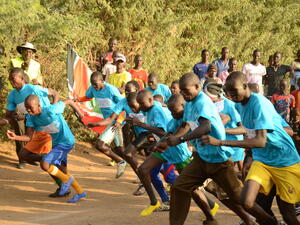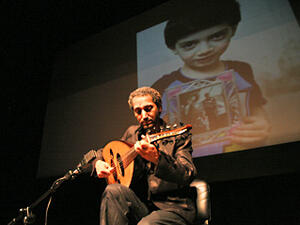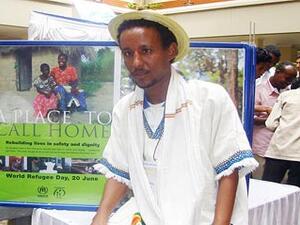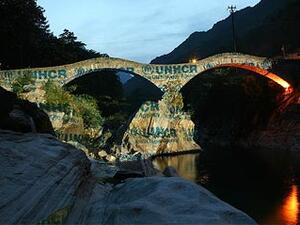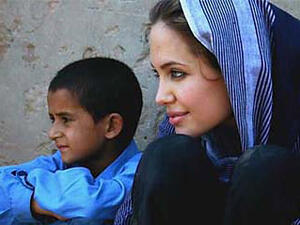Refugees in Ethiopia celebrate "birthday"
Refugees in Ethiopia celebrate "birthday"
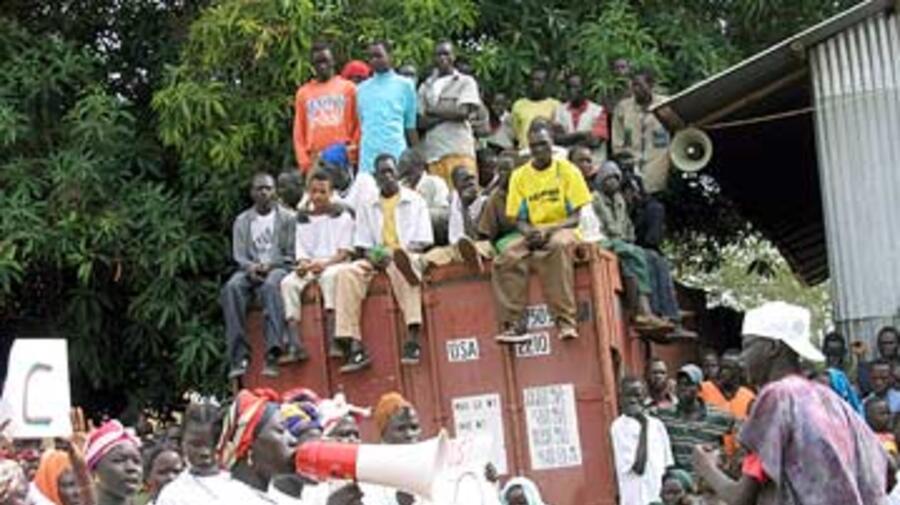
Getting a bird's eye view of World Refugee Day festivities at Sherkole camp in western Ethiopia.
SHERKOLE CAMP, Ethiopia, June 23 (UNHCR) - "When you are in exile, even the slightest thing makes you homesick and depressed," said John Henuk, a Sudanese refugee in Ethiopia. "But on June 20, depression has no place at all. World Refugee Day has a special place in my heart as it comes with the magical power of making me forget all my worries."
Henuk was shaking off his worries by singing and dancing non-stop at the World Refugee Day celebrations in Sherkole camp, western Ethiopia. Many of the camp's 16,165 refugees turned up for the half-day event on Monday, which featured cultural shows, games, speeches and award presentations. Special guests included an African Union delegation led by Malawian Ambassador Geoffrey Mvula, and UNHCR Deputy Representative Fernando Protti Alvarado.
The mood was euphoric and infectious as the ethnic Maban, Dinka, Fuji and Uduk refugees performed their traditional songs and dances. Wearing a colourful mix of traditional costumes and World Refugee Day T-shirts, the spectators could not help but join in the festivities.
Some of the refugees took the opportunity to highlight their concerns. Among the crowd were placards that read: "Stop the humanitarian crisis in Darfur, rescue the people of Darfur". These were refugees from the Darfur region of western Sudan, worried about their fate at a time when the rest of the refugees in Sherkole camp were gearing up for a possible return to South Sudan.
Speaking on behalf of the African Union, Ambassador Mvula said, "As we celebrate World Refugee Day today, negotiations are going on in Abuja, Nigeria between the government of Sudan and Darfur rebels, and we strongly hope that this will lead to a comprehensive agreement which will bring lasting peace to the Darfur region." He assured the refugees of the AU's relentless efforts to create a continent where its citizens live in their home countries in safety and dignity.
UNHCR's Protti Alvarado praised the courage and resilience refugees have shown over the years. "I applaud the courage you have displayed in leaving your home country for exile and I also praise the courage you are showing to go back to your country," he said, referring to organised returns to South Sudan expected to start later this year following the peace deal signed in January.
The chairman of the refugee committee said World Refugee Day was like a birthday for refugees and thanked UNHCR and the government of Ethiopia for their assistance. "Now that the peace agreement in South Sudan seems to have held, it is only appropriate that we are given the chance to send our representatives on a reconnaissance mission there before repatriation begins."
Representatives of the Ethiopian government and the host region also addressed the refugees, assuring them of Ethiopia's continued support to their "respected guests".
Meanwhile, in the Ethiopian capital of Addis Ababa, government representatives, diplomats and heads of international agencies and non-governmental organisations gathered at the African Union Conference Centre and the Congo Hall to celebrate World Refugee Day with speeches, cultural activities, music performances, a video show, as well as a photo and refugee crafts exhibition and market.
Of particular interest to the audience were the testimonies of three refugees - current and former - on this year's World Refugee Day theme, "Courage".
Elisabeth Jeremaya, a Sudanese refugee in Bonga camp, western Ethiopia, spoke slowly and softly of her flight into exile, the death of her children and her desperation as a mother, a sad yet common story shared by millions of refugees in Africa. "I cried because my children had nothing to eat," she said. "I need courage to survive, courage to be a good mother, courage to persevere in a difficult life."
The 2000 Nansen Refugee Award winner Abune Paulos, Patriarch of the Ethiopian Orthodox Church, shared his own experience of persecution and exile under the Mengistu dictatorship in Ethiopia.
"The existence of persecution, hardship and all kinds of sufferings cannot eliminate courage but develop and strengthen it," said His Holiness, further highlighting that the day should be celebrated with a promise to help refugees regain the most basic human needs and a place to call home.
Another former refugee, Rwandan genocide survivor Esther Mujawayo, came all the way from Germany to share an emotional testimony of her struggle to reconstruct her life after losing most of her family. "Conflict and war destroy everything, even the usual social support you could expect from your relatives and neighbours," she said. "I have been lucky enough to find myself in circumstances where I was able to overcome the past and speak again in the future tense."
She added, "I love the theme of courage because it reflects what we went through. Do not turn away, simply because courageous refugees are supposed being able to take care of themselves. They always need someone to listen to their call."
Mujawayo now works as a therapist in Germany for African refugees and asylum seekers, victims of conflict and persecution.
The event in Addis Ababa ended with a reception and cultural activities for UNHCR, its partners and refugees.
By Kisut Gebre Egziabher in Sherkole camp, Ethiopia

